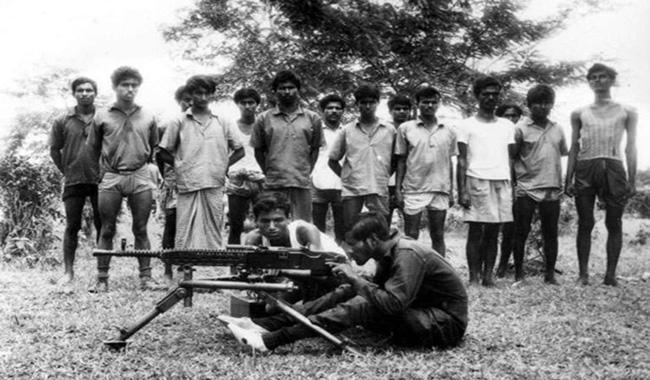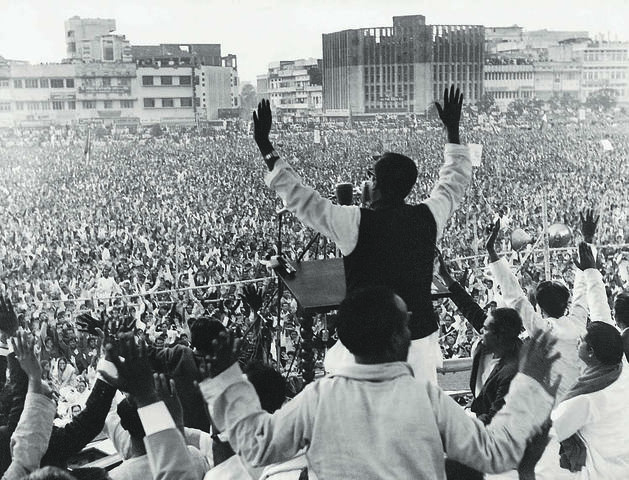Since 1971, in Pakistan, every year in the month of December, there is a lot of ‘breast–beating’ for the loss of East Pakistan. An equally vociferous demand for an apology comes from Bangladesh, formerly East Pakistan.
A Bengali demand for legitimate political, economic and social justice resulted in a political movement that degenerated into a civil war resulting in the breakup of the country. An inept Pakistani government at the centre did not have the political will, vision and the capacity to handle the coming disaster, which had taken years to make. India exploited the situation to its own advantage and dealt a crippling fatal blow to Pakistan by initially providing covert and thereafter, overt support that was followed by military intervention.
Although many suspect that the 1970 elections in East Pakistan were heavily rigged in favor of the Awami League, the demands of the eastern wing were generally legitimate and had resulted in alienation of a very big section of the population of East Pakistan. However, the stubbornness of some of the political leaders in the Western wing in not accepting the mandate of the Awami League and announcement of the postponement of the National Assembly session scheduled for the 3rd of March 1971 resulted in a reign of terror unleashed by activists of the Awami League and the Mukti Bahini (a militant organization trained by the Indians) against the non-Bengali population of East Pakistan.
Starting from 1st of March 1971 till 25th of March 1971, an orgy of rape, murder and slaughter was carried out against patriotic Bengalis, Biharis (as the Urdu speaking people were called) and Punjabis. Pathans and other ethnic groups had also settled there. Many units of the East Pakistan Rifles (EPR) and East Bengal Regiment (EBR) mutinied, killing their West Pakistani comrades and their families. At places, women and children asking for help from their erstwhile Bengali comrades/neighbors were kidnapped, raped and shot at point blank range.
Due to the mutiny of the East Bengali soldiers and officers, the strength of Pakistan army’s solitary No 14 Division had been reduced to half. Similar desertions in the Naval and Air Force units reduced their operational capabilities drastically. The remaining personnel of the military units were thoroughly frustrated and demoralized because they could not see the atrocities being committed by the Mukti Bahini against innocent women, children and unarmed patriotic citizens. At places, non-Bengali military personnel, wherever found alone or in small numbers, were attacked, brutally tortured and killed. The international press had even published some of these gruesome pictures.
The anger and frustration was such that there was some danger that if the operation codenamed ‘Searchlight’ had not been launched, the remaining elements of 14 Division might have also mutinied with the resultant breakdown of whatever law and order remained. When one’s immediate family is threatened, no loyalty to the country will stand the test.
On 23rd of March 1971, the Pakistan flag was flying only on the Governor’s house, the Dacca Airport and a few other places. The rest of the skyline was filled with Bangladeshi flags. What happened in East Pakistan from 1st March 1971 to 25th March 1971 is generally not known in Pakistan because the news were suppressed, fearing reprisals in West Pakistan. Two of my fighter pilot colleagues were caught and lynched when they were proceeding to another place of duty by car. As narrated by people who had also witnessed the partition of 1947, the atrocities committed by Mukti Bahini during those twenty five days surpassed even the worst of what had been committed during the partition of the Indian subcontinent.
Under the circumstances, the central government was left with no other option but to order a military operation to try to stop the genocide and preserve the unity of the country.
Operation Searchlight was launched on the night of 25th March 1971 by troops of a depleted 14 Division. Within the next few weeks, No. 9 Division and No. 16 Division were airlifted without their heavy weapons, via Colombo in a record time by a Herculean effort carried out by the Pakistan Air Force (PAF) and Pakistan International Airlines (PIA) – an airline which we are now trying to privatize. At times, the troops had to go into combat immediately after disembarking from their C-130 aircraft.
The Pakistan army had regained control of East Pakistan from April onwards till November 1971 when the Indians intervened military on 21/22 November. As the Pakistan army troops took back control of the areas occupied by the militants of Mukti Bahini they confronted horrific scenes at many places of mutilated body parts hanging on the trees. They liberated women from rape houses and men from slaughter houses. Even today there are thousands of people and families, especially living in Karachi who can vouchsafe for this. These atrocities committed by Mukti Bahini became the main reason for the terrible revenge/reprisals committed by Al-Badar and Al-Shams organizations that were formed with help of the Pakistan army.

During the retaliatory operations of the Pakistani forces many Mukti Bahini and Awami League militants were killed and many of their supporters were also killed in the mayhem that followed. No doubt military excesses were carried out in certain places but to say that three million people were killed is preposterous. Many independent sources estimated a total of about thirty to thirty five thousand deaths during those eight to nine months. The murders carried out by the Mukti Bahini and Awami League militants were also put in the Pakistan army’s basket. As so happens in war, truth becomes the first victim – thirty thousand became three lakh and three lakh became three million which means that eleven thousand people were being killed every day during those nine months, an unbelievable claim given the limitations imposed on the Pakistan army carrying out only targeted operations. Once India intervened militarily, the outnumbered Pakistani forces fought bravely till they were ordered to surrender.
The details of the surrender make a sad tale because while the fighting troops were holding well on the frontlines, the Pakistani Air Force base runway was put out of action through continuous air attacks by the Indian Air Force and PAF’s solitary fighter squadron was grounded after putting up a heroic fight. Consequently, the Indian army, taking advantage of the situation launched a heliborne attack and landed troops in Dacca.
Fearing massive casualties East Pakistan’s Theatre Headquarters lost the will to defend a hostile population and advised the Central Government, which ordered the Pakistan army in East Pakistan to lay down their arms. The field commanders were aghast at this decision and were completely taken by surprise. Thirty four thousand military personnel and fifty nine thousand civilian employees and families, making a total of ninety three thousand, were taken as prisoners of war and shifted to Indian war detention centers.
The crisis showed the best and the worst of human character and behavior. Many Bengalis showed unflinching loyalty and support for a united Pakistan and laid down their lives for what they believed in. A slightly injured General got himself evacuated along with female nurses whereas a young PAF Flying Officer Sohail Ismail, a co-pilot of one of the last helicopters, displayed the highest standards of chivalry by giving his own seat to a lady and surrendering himself to the enemy and languishing in the prisoner of war camps for the next two and a half years.
The historical narrative of the separation of East Pakistan is highly politicized and sensitive in Bangladesh whereas in Pakistan there is indifference and fatalistic. Dacca was the birth place of the Muslim League and modern Muslim nationalism in the Indian Sub-Continent.
After the partition of 1947 the Bengalis of East Pakistan expected an equitable treatment by the central government in the western wing, but instead they felt that their linguistic (Urdu and only Urdu), cultural, economic and political rights were being suppressed. Religion alone was not a strong enough bond. Eventually, East Pakistan imploded from within because the battle for the hearts and minds of the people was already lost.
Every war is horrible and civil wars even more so. Due to the massacres committed by the Mukti Bahini and Awami league activists, especially during the period first March 1971 till twenty fifth March 1971, an apology may be made conditional on a reciprocal apology from Bangladesh. However, our Bengali brothers do deserve an apology from us for the way we treated them in those earlier twenty three years a trust which we failed to keep.
For our own future generations in Pakistan, we must learn lessons from the tragedy of East Pakistan. We must respect the election mandates and ensure political, economic and social justice for all segments of society as well as rein in the new dangers of sectarianism and religious extremism. We must win the battle for the hearts and minds of the people. If we fail, we may not get another chance.




